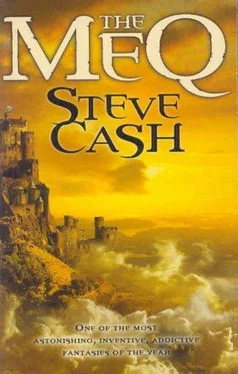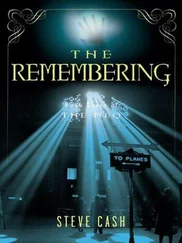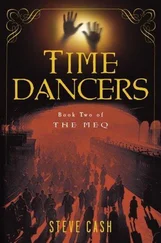Steve Cash - The Meq
Здесь есть возможность читать онлайн «Steve Cash - The Meq» весь текст электронной книги совершенно бесплатно (целиком полную версию без сокращений). В некоторых случаях можно слушать аудио, скачать через торрент в формате fb2 и присутствует краткое содержание. Год выпуска: 2005, Издательство: Del Rey, Жанр: Фэнтези, Детективная фантастика, ya, на английском языке. Описание произведения, (предисловие) а так же отзывы посетителей доступны на портале библиотеки ЛибКат.
- Название:The Meq
- Автор:
- Издательство:Del Rey
- Жанр:
- Год:2005
- ISBN:нет данных
- Рейтинг книги:4 / 5. Голосов: 1
-
Избранное:Добавить в избранное
- Отзывы:
-
Ваша оценка:
- 80
- 1
- 2
- 3
- 4
- 5
The Meq: краткое содержание, описание и аннотация
Предлагаем к чтению аннотацию, описание, краткое содержание или предисловие (зависит от того, что написал сам автор книги «The Meq»). Если вы не нашли необходимую информацию о книге — напишите в комментариях, мы постараемся отыскать её.
The Meq — читать онлайн бесплатно полную книгу (весь текст) целиком
Ниже представлен текст книги, разбитый по страницам. Система сохранения места последней прочитанной страницы, позволяет с удобством читать онлайн бесплатно книгу «The Meq», без необходимости каждый раз заново искать на чём Вы остановились. Поставьте закладку, и сможете в любой момент перейти на страницу, на которой закончили чтение.
Интервал:
Закладка:
My despair lasted the rest of that day and the next. I wandered through the open markets alone and sat for hours by a crumbling stone wall, staring at a lone acacia tree on the horizon. It was bent with the wind, permanently twisted and stretched, bare and isolated in the landscape, yet surviving. I thought continually of Star and her life. I thought of the Fleur-du-Mal and myself, then just before sunset of the second day I stood up and turned away from the tree and ran to find Emme. I had a hunch and, ironically, that was all we needed.
Emme had mentioned years earlier that Mulai and Jisil al-Sadi bred, trained, and traded mehari, the racing camels dating back to the earliest caravans. While I was loitering in the streets and markets, I overheard several excited conversations, some in Berber, some in Tuareg, between various groups of nomads, concerning a wedding and a camel race that would follow the celebration, occurring outside Tindouf in one week. The best and fastest camels from many tribes and distant points of the Sahara would be there. My hunch was that the al-Sadis would be among them. After I told Emme, she was amused at first, thinking it more than a long shot, then changed her mind and admitted it was at least a possibility.
The week passed quickly and on the morning of the wedding Emme and I were up early and scouting the race grounds and surrounding camps, still wearing our Tuareg clothing, but steering clear of all Tuareg encampments. By midafternoon, the wedding party arrived in clouds of dust, loud cheering, and clanging cymbals. The races began shortly after, with fifty or sixty camels and their drivers, snorting and yelping and coming off all at once from the starting line, which was a quarter of a mile across. Emme and I found a place to watch, standing next to a ragged group of camel drivers and slaves. The drivers were Tuareg and two of them nearest to us wore gold rings in their ears and bracelets made of ivory, silver, and turquoise up and down their arms. None of the others wore jewelry as rich and plentiful. It was unusual and Emme and I stayed near them just to listen. With our Tuareg turbans and veils masking our faces, they spoke freely without fear of an outsider’s presence. Their dialect was one I had never heard. Emme said it was archaic and used by only a few tribes, including the al-Sadis. She translated as they spoke, but two minutes into the race I didn’t need it. I distinctly heard one of them yell “Mulai!” and saw him point to the man who was leading the pack. I only managed to turn and look at the man for a few seconds before the whole group passed and he became invisible in the dust and sand. He wore dark blue from head to foot and gold strands were woven into the cloth, making it sparkle in the bright sunlight. Then Emme leaned over and translated what I couldn’t understand. They were also yelling, “My chief! My chief!”
Finally, we were in the right place at the right time. I glanced at Emme and she gave me a quick look, then stepped over to one of the camel drivers and grabbed his sleeve. I had no idea what she was doing or that she was going to do it. She lowered her veil and told the man that our chief wished to buy camels from Mulai al-Sadi — good camels— mehari; we would pay in gold. The man stared down at Emme and looked her over slowly. The other man came closer and looked at me, then focused on the pearl in Emme’s nostril. This was dangerous business. I knew they would either believe her now, or not at all. If they believed her now, we would have many doors open for us. If not, we had been exposed once and for all, and would most likely be killed by decapitation as soon as we left Tindouf.
Emme’s gaze was too powerful for the first man to doubt her and the other man stared at her pearl and thought of gold. The ruse worked, but only to a point. Neither of them had the authority to finalize any deal without the complete knowledge and approval of their chief. A meeting here, at the races, was completely out of the question. Emme kept after them. She was lying, of course, dropping names and telling them our chief had been under El Heiba and now wished to quit the resistance and return to his homeland and race camels. The drivers paused and stared at each other for just a moment, then the conversation changed in tone completely. She had finally come up with a name common to them all. This enabled the camel drivers to verify their trust and at least tell her the exact location in which Mulai would be pasturing his camels along with his prize Arab horses the following year, without ever having to say or use his name. It was an elaborate and baroque deal, but a deal nonetheless.
Emme never mentioned the “bluebird” by name but at the same time steered the dialogue toward a blue-eyed white girl our chief had sold to Jisil al-Sadi years before. Emme asked if Jisil had sold her yet; being so white and skinny, Emme thought she would never adapt. One of the men said that Jisil only wished he could buy and sell the girl. She was not his, the man said, and she never would be. He added that the problem would solve itself in little more than a year, when the girl would be sold — then their chief could get back to the business of camel racing full time. Emme asked if the girl ever traveled with them to events such as this. One of the men said no, never, that it could never happen. Then the other man interrupted him with a stern look and brought the conversation back to camels.
The races went on until early evening. Emme and I left long before that, but we now had what we needed — a time and a place. We would meet them there. We would be waiting.
As we were leaving, in the midst of shouts and swirling clouds of sand, I started laughing and couldn’t stop.
“Why are you laughing?” Emme asked.
“I don’t know,” I said. “It’s not that funny. I was remembering something.”
“What?”
“Another day similar to this one. The first time I rode a camel.”
Emme watched me for a moment, then reattached her veil. “Where was that?” she asked.
“In St. Louis.”
“Senegal?”
“No. Missouri.”
“When?”
“A lifetime ago. the day Star was stolen. The day an old friend died.”
“Look at me,” Emme said, unfastening her veil again, so I could watch her say the words. “We will find this girl, Z. She may not be Star anymore, but we will find her and free her.”
“I know. I just never thought it would be with camels.”
Early the next day Emme posted a letter to PoPo, telling him our good news and giving him our route and probable stops along the way, then we left Tindouf and began traveling in a zigzag, easterly direction. We were in no hurry and our final destination was still far away in the central Sahara and massif of Tassili-n-Ajjer. Our spirits were high and we talked at length about what the camel drivers had said and what it meant. It seemed clear that Star would be sold in just over a year, and that would be the same date the Fleur-du-Mal would do whatever it was he had in mind to do. What was not clear was Star’s relationship with Mulai and Jisil. Somehow, in some way, she had come between them.
For six long and uneventful months we had good luck with both the weather and the animals. We ran into no sudden storms and the camels stayed healthy. We even purchased two goats along the way. Why not, we thought; we were rich with hope. Emme talked often of the future, not only scenarios for Star’s rescue and escape, but for herself afterward. She said she might rethink a decision she had made concerning the mysterious A. B., the Frenchman from Saint-Louis in Senegal. She didn’t say what the decision was and I didn’t ask. I never asked about him because I never mentioned Opari. It had always been an area of mutual silence between us and seemed a fair trade.
Читать дальшеИнтервал:
Закладка:
Похожие книги на «The Meq»
Представляем Вашему вниманию похожие книги на «The Meq» списком для выбора. Мы отобрали схожую по названию и смыслу литературу в надежде предоставить читателям больше вариантов отыскать новые, интересные, ещё непрочитанные произведения.
Обсуждение, отзывы о книге «The Meq» и просто собственные мнения читателей. Оставьте ваши комментарии, напишите, что Вы думаете о произведении, его смысле или главных героях. Укажите что конкретно понравилось, а что нет, и почему Вы так считаете.












